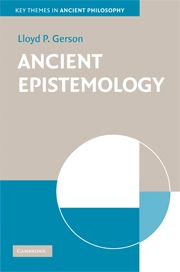Book contents
3 - Plato
Published online by Cambridge University Press: 05 June 2012
Summary
INTRODUCTION
In Plato's dialogues and according to Aristotle's testimony regarding his philosophical development, Plato's engagement with his predecessors' thinking about epistemological and metaphysical issues is nothing less than pervasive. At virtually every turn, we see him wrestling with the distinction between knowledge and belief, appearance and reality, epistemic and non-epistemic appearances and so on. He no doubt started with the universal Presocratic assumptions that knowledge is a real, not merely notional achievement, that it is more than merely belief, and that its desirability is manifest. As we shall see, however, he is prepared to scrutinise these assumptions from various points of view. His conclusions about the nature of knowledge are inseparable from his conclusions about what is knowable. Plato's successors in antiquity, despite revisiting the storehouse of Presocratic wisdom, are constantly grappling with these conclusions.
The value of knowledge over belief underlies the so-called early or Socratic dialogues in a straightforward way. Socrates' interlocutors, such as the preternaturally obtuse Euthyphro, typically believe that they know what a pious or just or temperate deed or person is. Euthyphro is confident that in prosecuting his father for the negligent homicide of a slave, he is engaging in a pious action. Socrates seems to assume that if one does not know what piety is, one is hardly in a position to persist in this confidence. Conversely, if one does possess this knowledge, one is in a powerful, if not invincible, position to acquire true beliefs about putative cases of piety.
- Type
- Chapter
- Information
- Ancient Epistemology , pp. 27 - 61Publisher: Cambridge University PressPrint publication year: 2009



